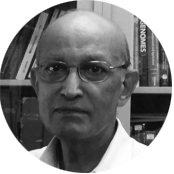Prof. S. C. Lakhotia is engaged, for nearly 55 years, in studying gene expression and its regulation, replication in chromosomes, cell stress response and significance of non-coding RNAs, mostly using the Drosophila model system,. Nearly all of his research work has been carried out in India. His work in late 1960s established cellular autonomy of hyperactivity of the single X-chromosome in male Drosophila to achieve dosage compensation. He was one of the first, in early 1970s, to demonstrate active transcription in heterochromatin. His group established temporal order of replication of independent replication units in polytene chromosomes in different cell types of Drosophila and revealed existence of two classes of active replicons in Drosophila. His groups made significant contributions to stress biology by showing differential expression of some of the major heat shock proteins in different cell types in Drosophila and discovering multiple genes for Hsp60 protein in Drosophila. His pioneering and life-time contributions to biology of the hsrɷ long-non-coding RNA gene normal development and under conditions of cell stress in Drosophila since 1970s are well recognized.
His recent contributions to Ayurvedic Biology, using the fly model, have provided a new stimulus to active research directed to understanding cellular and molecular mechanisms of actions of Ayurvedic Rasayanas and other formulations. Establishing Drosophila as a model for cell and molecular biological studies on actions of standard Ayurvedic formulation, his group demonstrated biological effects of Amalaki Rasayana and Rasa-Sindoor in the fly model to parallel those indicated in classical Ayurvedic texts. Significantly, both of them were shown to be very effective in suppressing neurodegeneration associated with Huntington’s or Alzheimer’s diseases. These findings were also confirmed in mouse models. He has written several articles on the need for active research in Ayurveda, strongly believing that unbiased proactive research using contemporary understanding of biological and material sciences is essential for revival of Ayurveda and its integration with contemporary health-care system.
Prof. Lakhotia, leading by personal example, is a strong votary of promoting high quality of research journals published in India. He has written many articles and organized discussion meetings on these issues and issues related to quality higher education in the country.
In recognition of his contributions in research and education, he has received many awards and recognitions, including fellowships of all the three science academies in India, the INSA Young Scientist Medal, the SS Bhatnagar Prize, UGC Career ward, UGC JC Bose Medal, INSA Aryabhata Medal, IASTAM Zandu International Oration (Indian Citizen) For Excellence in Research Contributions for Ayurvedic and or Natural Products. He is on editorial boards of journals like J. Biosciences, Cell Stress & Chaperones, RNA Biology, Annals of Neurosciences, Annals of Ayurvedic Medicine.
He is associated with the Zoology Department of Banaras Hindu University as a life-long Distinguished Professor. Currently he is also SERB Distinguished Fellow.




